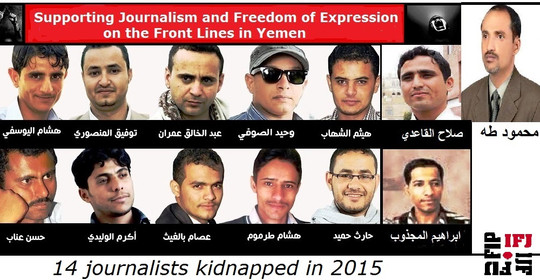Despite warnings from international organisations, including the IFJ, Ansar Allah have repeatedly broken all international conventions and norms on the treatment of prisoners. The journalists - Abdulkhaleq Ahmad Omran, Akram Saleh Al-Walidi, Al-Hareth Saleh Hameed, Tawfeeq Mohammed Al-Mansouri, Hisham Ahmad Tartoum, Hisham Abdulamalek Al-Yousefi, Haitham Abdulrahman Raweh, Issam Ameen Balgheith, Hassam Abdullah Anab and Salah Mohammed Al-Qaidi - have been subjected to physical and psychological violence and were denied health care or family visits. Journalists’ safety is a major concern in Yemen, where 36 media workers have been killed since 2011. Earlier this year the YJS denounced the arrest and torture of another journalist, Sabri Bin Mkhashen, at the hands of the security forces in Hadramout region which is under the control of the internationally recognized Yemeni government.
The YJS said in a statement that it condemns the criminal acts to which journalists have been subjected for several years including denial of family visits, access to health care and conditions of detention contrary to human dignity. The Union reiterates its call for the release of journalists and calls on the judiciary to prosecute those responsible for these criminal acts against journalists.
Anthony Bellanger, IFJ General Secretary, said: “We condemn any form of violence against journalists and demand that Ansar Allah complies with international conventions and norms. All those involved in the detention and torture of our colleagues will be held accountable. We also call on the UN agencies and UN envoys to Yemen to include these atrocities in their official reports to the UN bodies and take immediate actions to ensure the safety and well-being of our colleagues.’’



